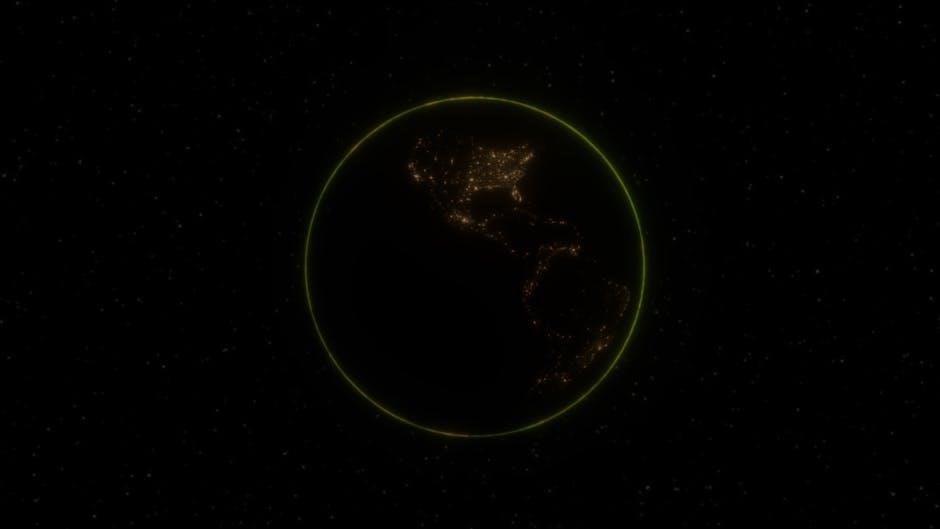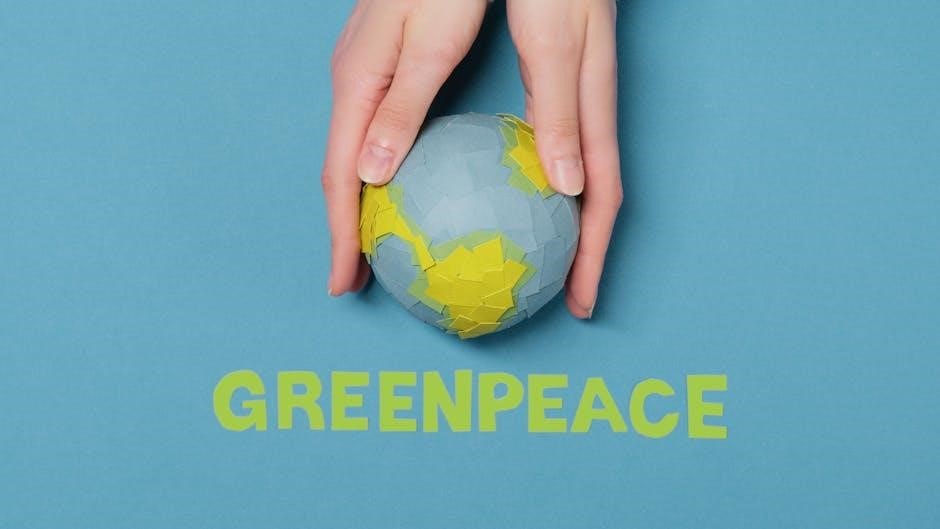Understanding Geopolitics: An Overview
Geopolitics is the study of how geography‚ power‚ and politics shape international relations and global dynamics. It examines how nations interact‚ compete‚ and cooperate‚ influencing stability and conflict. By analyzing territorial disputes‚ resource distribution‚ and strategic alliances‚ geopolitics provides insights into the complexities of a rapidly changing world. It helps policymakers and scholars understand the interconnectedness of global challenges‚ offering frameworks to navigate power shifts and environmental pressures. This field is essential for grasping the intricacies of modern statecraft and its impact on global governance.
Defining Geopolitics
Geopolitics is the study of how geography‚ political power‚ and economic interests shape international relations and global dynamics. It examines how nations interact‚ compete‚ and cooperate‚ focusing on territorial disputes‚ resource distribution‚ and strategic alliances. Geopolitics explores how physical landscapes‚ cultural identities‚ and political ideologies influence state behavior and global stability. By analyzing these factors‚ it provides insights into power struggles‚ conflict resolution‚ and the pursuit of national interests. This discipline is crucial for understanding the complexities of a changing world‚ where geography and politics are deeply intertwined‚ shaping the trajectory of global governance and international affairs.
Historical Context and Evolution
Geopolitics emerged as a distinct field of study in the late 19th century‚ influenced by thinkers like Alfred Thayer Mahan and Halford Mackinder. It initially focused on territorial control and resource competition‚ shaping early 20th-century power struggles. The concept of “geopolitical determinism” gained prominence‚ suggesting that geography dictates national destiny. Over time‚ geopolitics evolved to incorporate economic‚ cultural‚ and ideological dimensions‚ particularly during the Cold War. Today‚ it addresses globalization‚ climate change‚ and technological advancements‚ reflecting a broader understanding of power dynamics. This evolution underscores how geopolitics adapts to changing global realities‚ remaining a critical lens for analyzing international relations.

Key Concepts in Geopolitical Analysis
Geopolitical analysis focuses on understanding power dynamics‚ territorial disputes‚ and resource competition. It examines how geography shapes national interests‚ alliances‚ and conflicts‚ while addressing economic and military strategies.
Geographical Determinism and Its Critics
Geographical determinism posits that physical geography shapes human behavior‚ culture‚ and political outcomes. Critics argue this oversimplifies complex interactions between environment and society‚ neglecting human agency and technological advancements. While geography influences resource distribution and strategic positions‚ it is not the sole determinant of national fate. Critics like Carl Sauer and Richard Hartshorne challenged determinism‚ emphasizing the role of culture and politics. Modern debates recognize geography’s role but stress the interplay of multiple factors. This critique highlights the need for a nuanced approach to understanding geopolitical dynamics‚ avoiding reductionist views that ignore historical and social contexts.
The Role of Power and Influence in International Relations
Power and influence are central to geopolitical dynamics‚ shaping how nations interact and compete. Hard power‚ such as military and economic strength‚ enables states to project influence globally. Soft power‚ including cultural and ideological appeal‚ fosters cooperation and allegiance. Emerging powers like China and India are reshaping global hierarchies‚ challenging traditional dominance. Influence is also exerted through international institutions and alliances‚ reflecting shifting balances of power. Understanding these mechanisms is crucial for analyzing contemporary geopolitics‚ as nations navigate a multipolar world where influence is contested and renegotiated continuously.

Modern Geopolitical Challenges
Today’s geopolitical landscape faces rapid shifts in global power‚ technological advancements‚ and environmental pressures‚ creating complex challenges for international stability and cooperation.
Climate Change and Resource Competition
Climate change has emerged as a critical geopolitical challenge‚ intensifying competition for scarce resources like water‚ energy‚ and arable land. Rising temperatures and extreme weather events disrupt economies and trigger migration‚ fueling tensions between nations. Resource-rich regions‚ such as the Arctic‚ are becoming contested zones due to melting ice and access to new trade routes; Meanwhile‚ countries are increasingly prioritizing energy security‚ shifting toward renewable sources but also vying for control of traditional fossil fuel reserves. These dynamics threaten global stability‚ as resource scarcity and environmental degradation exacerbate existing conflicts and reshape international alliances.
The Rise of Emerging Powers and Shifts in Global Influence
The rise of emerging powers‚ particularly in Asia and Africa‚ is reshaping global influence and challenging the existing world order. Countries like China‚ India‚ and Brazil are asserting their economic and political might‚ shifting the balance of power away from traditional Western dominance. This shift is evident in trade‚ technology‚ and military capabilities‚ as these nations increasingly influence global governance and multilateral institutions. The transition is not without tensions‚ as established powers resist ceding their dominance‚ leading to strategic rivalries and competition for resources. This dynamic is reshaping alliances and creating new opportunities and challenges for international cooperation and conflict.

Tools for Analyzing Geopolitical Dynamics
Mapping‚ spatial analysis‚ and economic indicators are essential tools for understanding geopolitical shifts‚ enabling the assessment of power dynamics‚ resource competition‚ and territorial influences in global affairs.
Mapping and Spatial Analysis
Mapping and spatial analysis are crucial tools in geopolitical studies‚ enabling the visualization of territorial boundaries‚ resource distribution‚ and strategic locations. These methods help identify patterns in global power dynamics‚ such as military bases‚ trade routes‚ and areas of conflict. By analyzing geographic data‚ policymakers can better understand how physical landscapes influence political decisions and international relations. Spatial analysis also aids in predicting potential flashpoints and assessing the impact of environmental changes on geopolitical stability. This approach provides a visual and data-driven framework for comprehending complex interactions between geography‚ power‚ and diplomacy in an increasingly interconnected world.
Economic and Military Indicators
Economic and military indicators are pivotal in assessing a nation’s geopolitical influence. GDP‚ trade balances‚ and resource control reflect economic strength‚ shaping global power dynamics. Military capabilities‚ including defense spending and technological advancements‚ signal a nation’s ability to project power. These indicators help analysts predict potential conflicts and alliances. For instance‚ rising military expenditures in emerging powers indicate shifting global influence. Economic sanctions and trade agreements also reveal geopolitical strategies. By monitoring these indicators‚ policymakers can anticipate threats and opportunities‚ ensuring informed decision-making in an increasingly competitive international landscape. These metrics are essential for understanding the interplay of power and economics in geopolitics.

Case Studies in Contemporary Geopolitics
Examining the Indo-Pacific region and the Ukraine-Russia conflict reveals how geopolitical tensions shape global stability‚ highlighting the intersection of power‚ territory‚ and international alliances in modern conflicts.
Eastern Europe and the Ukraine-Russia Conflict
The Ukraine-Russia conflict is a focal point of geopolitical tension‚ driven by historical ties‚ territorial disputes‚ and competing alliances. Russia’s annexation of Crimea in 2014 and ongoing support for separatist groups in eastern Ukraine have destabilized the region. NATO’s expansion into Eastern Europe has exacerbated tensions‚ with Russia perceiving it as a threat to its sphere of influence. The conflict highlights the complexities of post-Cold War geopolitics‚ where ethnic‚ political‚ and economic factors intertwine‚ shaping the balance of power in Europe and beyond. It underscores the challenges of maintaining regional stability amidst great power rivalry.

The Indo-Pacific Region and Strategic Rivalries
The Indo-Pacific region has emerged as a critical geopolitical hotspot‚ marked by intensifying strategic rivalries. The U.S.-China competition dominates the landscape‚ with both powers vying for influence over trade routes‚ military alliances‚ and economic partnerships. India’s rise as a regional power further complicates dynamics‚ as it seeks to counterbalance China’s expanding presence. The Quad grouping and regional security pacts highlight the growing importance of multilateral cooperation. Territorial disputes in the South China Sea and economic competition add layers of tension. This region is pivotal in shaping the future of global power dynamics and international relations.

The Future of Geopolitics
Technological advancements and shifting power dynamics will reshape global relations‚ emphasizing sustainability and multilateral cooperation to address emerging challenges and ensure a stable international order.

Technological Advancements and Their Impact
Technological advancements are reshaping geopolitics‚ with innovations like artificial intelligence‚ cyber warfare‚ and space exploration altering global power dynamics. These technologies enable nations to project influence beyond traditional territorial boundaries‚ creating new arenas for competition and cooperation. The rise of digital surveillance and data-driven decision-making further complicates international relations‚ as countries strive to maintain sovereignty and security in an increasingly interconnected world. Meanwhile‚ emerging technologies like renewable energy systems and autonomous weapons challenge existing geopolitical strategies‚ forcing nations to adapt and redefine their roles in a rapidly evolving global landscape.
The Role of Non-State Actors and Global Governance
Non-state actors‚ such as multinational corporations‚ NGOs‚ and cyber groups‚ play a significant role in shaping modern geopolitics. These entities often wield considerable influence‚ bypassing traditional state-centric systems. They can impact global governance by lobbying for policy changes‚ controlling resources‚ or disseminating information. The rise of non-state actors challenges the dominance of nation-states‚ creating new power dynamics. This shift compels governments to adapt and collaborate more effectively with these entities to address global challenges. As a result‚ the interplay between state and non-state actors becomes increasingly critical in shaping international relations and the future of global governance.
Geopolitics remains a dynamic field‚ shaping global interactions and power dynamics. Understanding its complexities is crucial for navigating an increasingly interconnected world‚ ensuring informed decision-making and sustainable strategies.

Summarizing Key Insights
Geopolitics is a dynamic field that examines the interplay of geography‚ power‚ and politics in shaping global interactions. Key insights include the role of resource competition‚ territorial disputes‚ and emerging powers in reshaping international relations. Climate change and technological advancements further complicate these dynamics‚ demanding adaptive strategies. Understanding these elements is crucial for addressing contemporary challenges‚ from regional conflicts to economic shifts. By analyzing these factors‚ policymakers and scholars can better navigate the complexities of a changing world‚ fostering cooperation and stability in an increasingly interconnected global landscape.
Implications for Policymakers and Scholars
Geopolitical analysis provides critical insights for policymakers and scholars‚ enabling informed decision-making in a rapidly evolving global landscape. Understanding power dynamics‚ resource competition‚ and territorial disputes allows policymakers to craft adaptive strategies that mitigate conflicts and foster cooperation. Scholars benefit from geopolitical frameworks to identify patterns and predict future challenges‚ offering academic rigor to real-world issues. Together‚ these insights promote a deeper understanding of global stability and instability‚ aiding in the development of policies that address environmental‚ economic‚ and security challenges. This collaborative approach ensures that geopolitical knowledge remains a cornerstone of effective governance and academic research.




About the author